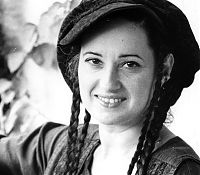Victoria Mindova
Pleasant surprises and the desire of people to look for solutions even in the darkest days never stop filling me with enthusiasm. Sofia Papachristou is a lawyer, scenographer and director. She is not afraid of trying her hand at different genres and has a particular passion for animation. She has produced feature-length and short documentaries and feature films, which never lack a dose of humour.
 Papachristou is remarkable not only for her deep creativity, but also for her highly developed sense of social justice. She is the creator of the documentary "Social economy: an alternative" and she is talking about the development opportunities provided by socially responsible business activities with GRReporter exclusively.
Papachristou is remarkable not only for her deep creativity, but also for her highly developed sense of social justice. She is the creator of the documentary "Social economy: an alternative" and she is talking about the development opportunities provided by socially responsible business activities with GRReporter exclusively.
In her film, she presents a series of successful small- and medium-sized enterprises across Europe which are based on three core principles - collaboration, solidarity and transparency. The film was funded by the Heinrich Böll Institute in Greece and the European Green Party. Its premiere was at the European Parliament in Brussels after which it was presented in Thessaloniki and Athens.
Tell us more about the film "Social economy: an alternative". How was the idea born and did you find positive examples of sustainable economic growth?
Let us start from the definition of social economy, because it may not be clear to all. Social economy is the middle way between state-controlled economy end extreme capitalism, roughly speaking. In social economy, there is a profit, but it is not an end in itself.
The profit is distributed between the participants engaged in the activity but a greater part of it is invested in the creation of new jobs through the production of environmentally friendly goods and services.
Social economy is developed mainly by cooperatives and small, even sole proprietorships. Its purpose is to create added value and services from people to people. Excessive profit is contrary to this business philosophy. Do not get me wrong – this is not about turning back to barter trade. Accumulating money simply is not an end in itself. The profit is needed to allow the people to earn a decent living and to make additional investments in a sustainable and environmentally friendly economic model that will ensure the opening of new jobs in the process of growth.
Where did you find such examples of real functioning social economies by regions?
The film was shot mainly in Western European countries - Belgium, Germany, France, Austria, Italy and we shot a little in Greece too. I hope that in a few years, we will find here more examples of this type of sustainable development.
We visited almost 40 social enterprises and talked with more than 100 people in order for us to be able to gather enough information about the project.
It turns out that "Social economy: an alternative" is the only documentary on the subject that covers such a large number of similar projects in different European Union countries. If I have to be honest, the only reason why we did not include other examples in the film was time and budget restrictions. We wanted to visit both Denmark and Spain, which are two countries with well-developed systems of social economy.
What was the idea that instigated you to create this project?
We looked for positive examples of sustainable development in times of crisis, when the established economic model obviously is no longer able to withstand the pressure of time. Nikos Chrisogelos, who is a member of the European Green Party and a Representative of Greece to the European Parliament, helped us a lot to make the film.
What impressed you the most while you were shooting the film?
I was impressed the most by ethical banks such as GLS Bank and Folks bank in Germany, Banka Etina Populare in Italy. These banks were created by people associated with various social movements in Europe in the 1970s. In Germany, they were established by people from organizations for animal protection and in Italy, there were strong movements for protection of peace, against weaponry or against antiracist organizations. People who were part of a similar type of movements initiated the creation of the social type of economy.
Ethical banks were created on the model of all other financial institutions but they do not play on the stock market. They do not stake on high-risk or speculative operations. Like all other banks, they have deposits and loans but they do not participate in the gambling known as the world economy. They fund small and medium-sized businesses that want to develop sustainable production. They offer different banking products, which are aimed at the funding of ecological products, business initiatives with a social or an environment focus as well as at the purchase of a first home.
Most importantly, these type of banks are extremely healthy. For example, in the case of Germany, the cooperative banks that are based on the model of social economy were the only ones, which have not been affected by the recent global financial crisis. Not only did they not need aids from the state to be saved but they provided funding to other banks in order for them to avoid bankruptcy.
Ethical banks have some basic principles, which they follow consistently. One of them is the full transparency of transactions. Loans are available online and everyone, who is interested, can check on who receives loans, under what conditions and for what activity. They do not speculate on the market and provide funds only for the real economy.
Do you have a picture of the size of these banks?